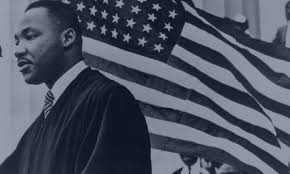Martin Luther King
?1.20.2020
January 16, 2020“It really boils down to this: that all life is interrelated. We are all caught in an inescapable network of mutuality, tied in a single garment of destiny. Whatever affects one directly, affects all indirectly. We are made to live together because of the interrelated structure of reality.”
– Dr. Martin Luther King Jr, 1967.
Prayer, contemplation, is freedom and affirmation growing out of nothingness into love. Prayer is the flowering of our inmost freedom, in response to the Word. Prayer is not only dialogue with God: it is the communication of our freedom with ultimate freedom in infinite spirit. It is the elevation of our limited freedom into the infinite freedom of the divine spirit and of the divine love. Prayer is the encounter of our freedom with all the all-embracing charity which knows no limit and knows no obstacle. Prayer is an emergence into this area of infinite freedom. Prayer, contemplation, then, is not an abject procedure, though sometimes it may spring from our abjection. But prayer is not something that is meant to maintain us in servility and helplessness. We take stock of our own wretchedness at the beginning of prayer, contemplation, in order to rise beyond it and above it to infinite freedom and infinite creative love in God.
-Thomas Merton, Contemplation in a World of Action, 1965
When do we
become one with earth and stars?
It is not achieved, a young friend, by being in love,
however vibrant that makes your voice.
Learn to forget you sang like that. It passes.
Truly to sing takes another kind of breath.
A breath in the void. A shudder in God. A wind.
-Rilke, Sonnets to Orpheus I, 3
Because Jesus did not directly attack the religious and institutional systems of his time until his final action against the money changers in the temple [1], his primary social justice critique and action are a disappointment to most radicals and social activists. Jesus’ social program, as far as I can see, was a quiet refusal to participate in almost all external power structures or domination systems. Once we have been told this, we see it everywhere in the four Gospels. Jesus chose a very simple lifestyle which kept him from being constantly co-opted by those very structures, which we can call the sin system.
The city of Sepphoris was the Roman regional capital of Galilee and the center for most money, jobs, and power in the region where Jesus lived. It was just nine miles from Jesus’ hometown of Nazareth. Yet there is no record that Jesus ever went there, nor is it mentioned once in the New Testament, even though he and his father, Joseph, were carpenters or “workmen” and Jesus traveled through many other cities much farther away. He also seems to have avoided the money system as much as possible by using “a common purse” (John 12:6, 13:29)—voluntary “communism,” we might say.
Jesus was finally a full victim of the systems that he refused to worship. Is this not a much more coherent explanation of why Jesus died?
What can we learn from Jesus’ life about how we might address the systems of inequity and oppression in our own cultures? One lesson seems to me that we have to “start local.”
He simply goes around doing what he knows to be right, which he surely discovered during his long periods of solitude and silence (a form of contemplation) on the outskirts of town, and others begin to join him.
-Fr. Richard Rohr, Center for Action and Contemplation
